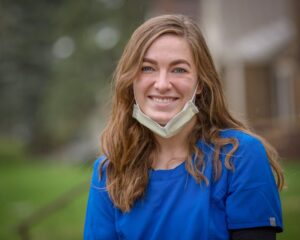BY DAVE HRBACEK
Catholic News Service
ST. PAUL, MINNESOTA (CNS) – Rebecca Maslow's workday begins long before she walks through the doors of Hennepin County Medical Center in Minneapolis, where she is a nurse in the intensive care unit.

She prays before going to work, seeking the help of the Holy Spirit to love and care for the patients she will see that day. Every time she walks into a room, she knows that this could be the patient's last day of life. She must be ready to help them die.
That's because, woven into her job description in recent months is caring for seriously ill and dying patients, most of whom have COVID-19. Since being assigned primarily to the intensive care unit in March, she now sees the worst of the coronavirus pandemic every day. It is exhausting work, physically and emotionally, and she can't for a moment neglect the intensive protective regimen needed to keep her from getting the virus herself.
At the same time, she feels that avoiding the virus likely is a losing battle.
"I know that I will probably get it in the near future," said Maslow, 28, who graduated from the University of Minnesota in 2014 with a nursing degree and belongs to Nativity of Our Lord Parish in St. Paul. "Most of us (hospital employees) have a resignation that we'll probably get this at some point simply by being exposed to it so frequently, even though we're taking these precautions."
But that is not the hardest part of being a nurse who is constantly exposed to the virus. The real hardship comes when she thinks about the care she cannot provide to the person lying in a bed unable to get up and, more importantly, unable to see visitors.
"The only people who are walking into their rooms are healthcare workers who are covered from head to toe in protective gear," she told The Catholic Spirit, newspaper of the Diocese of St. Paul and Minneapolis. "There was one patient that I was helping to care for. ... He was anxious, and I was trying to comfort him. But, it just struck me – he could barely see my face. I'm smiling at him, but he can't see it because I have this mask over my mouth; my eyes are covered in protective covering; I have a surgical cap on my head; I have an isolation gown on, and gloves.
"Physical touch is such an important thing, right?" she said, "especially when someone's feeling isolated and alone. And, to not be able to have that connection with other people is just so hugely challenging."
Fortunately, Maslow has devised new and equally meaningful ways to put her hands to work in providing care to COVID patients.
For one patient, she held an iPad in front of him so he could have a final Zoom call with his family as he lay dying. He was unresponsive, but at least family members could see him even though it wasn't the same as being there.
"I can just vividly imagine the agony of not being able to be there as your family member, your loved one, is dying," she said. "And, it just broke my heart as I was in the room. I was listening to what the family members were saying. And, the daughter was talking to her dad (the patient). She was forgiving him for all the hurts he had done (to) her throughout her life, telling him repeatedly how much she hopes he can go to God, knowing that she forgives him, knowing that she loves him and praying that he'll accept God's mercy and love."
Silently, unbeknownst to the family, which couldn't see her on the screen, Maslow took it all in – and prayed.
"I just got this sense (that) we're all connected as the body of Christ," she said. "And, somehow, in some small way, maybe the Lord was answering a little bit of her prayer, providing for her father by having me there when she couldn't be there. I think in those moments, especially when it's so hard to know what to say and there's urgency in some of those heartbreaking situations, I just found myself more constantly praying, 'Come, Holy Spirit.'"
Hrbacek is a staff writer for The Catholic Spirit, newspaper of the Archdiocese of St. Paul and Minneapolis.
